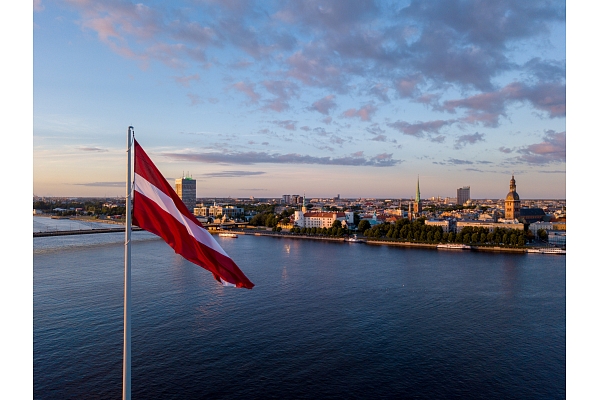Investors from 135 countries invest in Latvia
Investors from 135 countries made investments in Latvian companies last year. At the end of 2016, there were 29,273 companies registered in Latvia that were fully or partly owned by foreigners. Altogether 29,692 foreigners hold shares in Latvian companies. They now represent 135 countries, as last year investments in the share capital of Latvian companies were made by persons from two countries – Senegal and Cameroon – which previously were not represented among foreign investors in Latvia. Looking at the sectors that received the largest investments in 2016, the leaders are the same as in 2015 – warehousing and transport auxiliary services, production of non-metalic mineral products and real estate operations. But construction and forestry and logging have replaced wholesale trade and financial services on the list. A comparison between the average results of the Latvian-registered companies with the financial results of those companies, which received foreign investments last year, revealed that that the latter had showed much larger turnovers but had also reported larger losses. Altough the turnover of the companies, which received foreign investments in 2016, decreased by 1.62% from 2015, it is still much higher than the country average. In 2014 the average turnover of such companies was EUR 85,580 and the country average was 4.5 times smaller, but in 2016 the turnover of the companies, which had received foreign investments, was 4.1 times higher than the country average. On some occasions a trend was observed to bring in foreign investors in an attempt to revive a business in trouble but such cases are rare. For example, the records show that last year one company received foreign direct investment after a legal protection proceeding was launched for it at the beginning of the year.
Accumulated FDI shrinks by EUR 211.59 million
Foreign direct investments (FDI) made in Latvian companies from 1991 till the end of 2016 total EUR 7.21 billion which means that foreigners own about 29% of the aggregate registered share capital of active Latvian companies. Compared to 2015, accumulated FDI shrank by EUR 211.59 million last year. One of the reasons behind the overall reduction of FDI was the decision by Swedbank Latvia to reduce its share capital by EUR 367.85 million. The decision was made taking into account the financial performance of Swedbank Latvia with the intention to optimize the bank's capitalization level and to transfer to the parent company that part of the capital which created an additional administrative and financial burden. Looking back at the recent years, it has to be said that the accumulated FDI is decreasing with every year. In 2009 accumulated FDI in the share capital of Latvian companies increased by EUR 1.05 billion buti n recent years the FDI growth was just EUR 150 million in 2014 and EUR 190 million in 2015. Time will show whether the year 2017 will bring any positive changes regarding foreign investors but one should not pin much hope on significant increase in investor interest due to cautious attitude by potential investors. However, in January 2017, foreign investments in the share capital of Latvian-registered companies increased by EUR 17.35 million. Foreigners were involved in 590 transactions with shares in January this year. About 300 of those transactions were related to liquidation of dormant companies but the rest of them concerned investments in the share capital.
ZGI Capital venture capital company gets title Investor of The Year
The last year's most successful investors were awarded for their contribution to promotion of investments in Latvia at the Investor of The Year 2016 award ceremony in January 26 this year. The Investment of The Year award in the corporate segment went to the fund management company ZGI Capital for investment in mobile payment provider Mobilly. ZGI-3 fund has invested in 19 companies with maximum investment per company limited to EUR 1.5 million. The Investor of the Year award for individuals was handed to Anatolijs Prohorovs, Associate Professor at RISEBA University of Business, Arts and Technology and the CEO of Proks Capital for his contribution to music and sound technology company Sonarworks. The law office Cobalt received The Legal Advisor of The Year award for providing consultations to investment fund Marguerite about purchase of shares in Latvijas Gaze natural gas utility, to Austrian venture capital company AMIC Energy Management GmbH about purchase of shares in gas filling station chain operator LUKoil Baltija R and to Estonian venture capital company Koha Capital about investments in Latvian start-up Giraffe360. The Most Profitable Investment of The Year award for the individuals was given to Jevgēnijs Roščins for his contribution to Tooth Fairy's Tools, a project for development of innovative dental solutions. The Most Environment-friendly Investment of The Year award was handed to Ģirts Cēlājs for investments in Blue Shock Race project for production of electric go-karts and development of kartodroms. The Patron of The Year award went to the Riga Technical University for its support to education of the managers of start-ups and to creation of protoypes as well as to promotion of commercialization of inventions. The annual Investor of The Year awards were launched in 2015 by the Latvian Private Equity and Venture Capital Association in cooperation with the Latvian Business Angel Network with the purpose to facilitate investments in Latvia through expanding the investor network.
German investors' sentiment positive
The sentiment of German investors in Latvia obviously improved in 2016 compared to 2015. In particular, every other German company doing business in Latvia expects export growth, according to a survey by the German-Baltic Chamber of Commerce in Estonia, Latvia and Lithuania (AHK) that was carried out also in other countries in Central and Eastern Europe. The survey was conducted among AHK members active in Estonia, Latvia and Lithuania. "The overall sentiment in Latvia is currently much more optimistic compared to the beginning of the previous year. A year ago the German companies active in Latvia were mostly concerned about the problems related to the geopolitical developments in the world. Neverthelesss, most of the companies that participated in the survey expect positive growth of their business," said Florian Schröder, CEO of the the German-Baltic Chamber of Commerce. Acording to the results of the survey, 65% of the companies expect positive business growth with two-thirds anticipating turnover growth, which is a rise by 22 percentage points from 2015. The number of companies that expect growth of exports has more than doubled. The results of the survey in Latvia are better than in Lituania and Estonia where export growth is expected by 44% and 30% of respondents respectively. The German businesses are also increasingly pleased with Latvia as a target for investment when compared to other Central and Eastern European countries. In their opinion, Latvia is the second most attractive country for investment among all twenty countries covered by the survey. Only Estonia was rated higher than Latvia and Lithuania was in the third place.
Waiting for Japanese
On January 18, 2017, Latvian Finance Minister Dana Reizniece-Ozola and Motome Takisawa, Parliamentary Vice-Minister for Foreign Affairs of Japan, signed a tax treaty. The document will bring clarity to investors about the size and conditions for taxation of their income in the respective country. The tax treaty will facilitate the operations of Japanese investors in Latvia and vice versa, encouraging foreign investments. Latvia has become the first of the three Baltic states to sign a tax treaty with Japan. The work on the treaty began in 1992. So far Latvia has held negotiations about tax treaties with 71 countries, and 59 treaties have taken effect.
IKEA's arrival sends positive signal to investors
The decision by Swedish furniture retailer IKEA to enter Latvia is a a signal to other companies to expand into the Latvian market and a strong proof to Latvia's ability to attract investments from Scandinavia, said Andris Ozols, the head of the Latvian Investment and Development Agency. IKEA's planned arrival in Latvia is also a confirmation of security in the Baltic region, he said adding that, with time, the opening of the IKEA store in Latvia might indirectly result in influx of other investments. "At the time when security in the Baltic states is being unjustly criticized and questioned, it is a symbolic confirmation on part of the businessmen representing the Swedish brand IKEA in the Baltics that they know our region well and are willing to invest a large amount - EUR 60 million. They have confidence in our region and their business plan which had worked well in case with the IKEA store in Lithuania," said Ozols. The construction of the IKEA store in the region of Stopini just outside the Latvian capital Riga is to begin in the spring of 2017 and is to be completed in about a year-and-a-half.
Number of M&A deals grows in Baltics in 2016
The Baltic merger and acquisition (M&A) activity has been positive in 2016, Prudentia cosultancy firm said in its annual overview, Prudentia M&A Folio. In total 186 Baltic M&A deals were announced in 2016, which is 13 deals or 7.5% more compared to 2015. The increase of M&A deal activity in 2016 is not surprising since such a positive end of the year was forecasted in the previous Prudentia M&A Folio. Considering historic transactions it can be concluded that the Baltic M&A market has an annual upward trend in terms of deal count. Furthermore, since 2013 Baltic M&A deal count has been growing by 22.6% annually (compound annual growth rate). With such a growth pace it can be expected that the year 2017 has a potential to outperform the very successful 2012 when 212 Baltic M&A deals were announced. Prudentia noted that in May 2016 it had closed the deal for raising private capital for Latvian national airline airBaltic. As a result, airBaltic raised a new EUR 131.1 million capital, where the Latvian state and German financial investor Ralf-Dieter Montag-Girmes contributed EUR 80 million and EUR 51.1 million, respectively. A very extensive M&A deal was announced at the end of 2016 when the Rimi Baltic parent ICA Gruppen announced their acquisition of Lithuanian UAB Palink for EUR 213 million. UAB Palink, which represents 230 IKI shops, is the second largest food retailer in Lithuania with an approximate market share of 15%. After the completion of the deal, Rimi market share in Lithuania is estimated to be 23%.
Estonia dominates in geographical distribution of M&A deals
As usual, local M&A deals (i.e. within one of the Baltic countries) dominated the market. In 2016, 89 transactions had target and acquirer representing the same Baltic country, which is by 9 transactions more compared to 2015. Furthermore, M&A transaction count, when each side of the deal comes from a different Baltic country, in 2015 and 2016 remained almost unchanged – 21 and 22, respectively. Estonian activity in 2016 must be emphasized. Estonians being a target appeared 71 times, but Latvia and Lithuania only 44 and 48 times, respectively. If deals are analyzed where target and acquirer represents a different country, Estonians again highlight themselves. In 29 M&A deals an Estonian company was acquired by a company coming from different country. In Latvia and Lithuania such deals were announced 21 and 15 times, respectively. In many previous periods it can be observed that the Baltic M&A intensity does not correlate with the absolute size of each economy, besides Estonians repeatedly have affirmed their relatively higher attractiveness in the eyes of investors. The Baltic M&A market in 2017 is rather ambiguous, which partly can be explained by political factors. On the other hand, this year we will probably see two large in size transactions – exit of few shareholders from Latvijas Gāze unbundled company Conexus Baltic Grid and the sale of Modern Times Group (MTG) Baltic business, Prudentia said.





